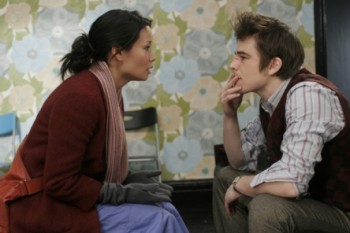|
So throughout the viewing of this film, I was plagued with this persistent and irrational underlying assumption that the film was set somewhere in England. Why did I think this? No one in the film has an English accent, the city doesn't look like an English city, no one says anything to the general tune of, "So here we are in merry old England; care for a scone?" Then, finally, it hit me: somewhere in the back of my mind the whole time was this notion that I'd gone to see a Guy Ritchie film. Thus my expectations were suddenly explicable. After all, most of the advertising I'd seen for Lucky Number Slevin seemed to be designed to create this exact impression, an impresssion which was not, in the final analysis, wholly accurate. The film has more in common with films such as The Usual Suspects and other such modern noir thrillers than it does with films like Snatch, and anyone who had gone in expecting a wacky romp about wisecracking criminals was going to have his or her expectations thwarted to some degree. The thing that kept going through my head after seeing the film in its entirety was "the abyss gazes also." More on that later. 
The story of a man mistakenly fingered by two rival gangs of mobsters as a man owing both gangs' bosses a hefty sum, this film could, after a fashion, be mistaken for a Guy Ritchie film for a while, provided that one skips the first scene, which reveals a much more sadistic, sinister mindset at work. Initially, the film is hard to get ahold of. The opening bits are more slippery than a baby harbor seal drenched in oil that's washed up on shore due to another example of carelessness and waste at the hands of our petrol-dependant slackass country, and tend to pop on and off without any sort of grounding context. This will annoy some, as it means you're going to have to pay more than casual attention, which our aforementioned slackass country isn't famously good at doing. I don't mind these things. I like difficult films. I've seen quite enough easy ones at this point in my life. Isolated shots of an anonymous phone ringing in front of some eye-defying wallpaper call to mind the films and aggressively non-intuitive approaches of David Lynch. Cool. I like to be properly confused. Things get coherent soon enough, though, and we follow Slevin as he tries to deal with the position he's found himself in without getting seriously killed by one or the other gang. A neighboring girl (Lucy Liu, who appears to be trying to fit the most utter definition of 'pixieish,' if indeed that really is a proper word) who pops by the apartment to borrow a cup with some sugar in it decides to help out by playing amateur detective, and stalks a mystery man played by Bruce Willis, who seems to be working both sides of the fence. Wacky hijinks ensue.  Structurally, the film sometimes isn't sure what it wants to be. Sometimes it really does seem to want to be a big, friendly puppy and slobber all over your face; our protagonist is afflicted (or blessed) by a condition of general peace of mind, meaning he's prone to saying the most inappropriate things in the face of getting his kneecaps busted the hell out. Sometimes this works. At other times, the humor feels as if it's trying too hard to be clever and witty, and comes off as too much of an artifice; how many times do they think it takes for the joke "Why do they call him the (insert nickname)?" "Because he's a (insert same nickname)" to magically become funny? It's also playing a hardball game of 'wink wink, nudge nudge' with the audience throughout, smugly dangling clues right out where we can see them; you can almost hear the director and writer snickering at you the whole time, especially if you're drunk or suffering from dementia. In some ways, it's an unfair handicap that modern screenwriters have to deal with far more than those of generations past. At this point, we've all seen so many films with clever meanderings that we're now almost more well-versed in film language than we are in English itself (and if the bulk if the Internet is any indication, perhaps far more well-versed), and consequently, even a public as slackassed as ours is harder than ever to fool. We don't want a mystery to be impenetrable and necessitate the "Scooby-Doo" sequence wherein the smarter characters elucidate for the rest of us just how, via some impossibly obtuse clues, the villain was at least revealed, but we do want at least the chance of being surprised and fooled. Slevin tries to be a little too clever, and tips its hand at us far too much to be missed. I've seen copious comparisons made to Tarantino, but I don't really see many similarities beyond the most superficial. Perhaps the most valuable contribution Tarantino has made to screenwriting is to subvert the typical "economy of dialogue" problem; not every single statement made in casual conversation will turn out to be a clue to what will happen later. It's an approach more writers would do well to take, even in films devoid of smartass criminals. When all's said and done, Lucky Number Slevin is fun but not fascinating, technically adroit but lacking in serious substance. The most interesting character in the film, played by Morgan Freeman, comes closest, playing The Boss as a man of contradictions: a warm, affable guy with the heart of a devil and a sense of righteous indignation he has no right to possess. But when it all winds down, it feels as though we've been given the ending that the audience wants as opposed to the one the film deserves. Hence, my post-viewing fixation on the phrase "the abyss gazes also:" some attention should have been given over to the notion posited in one of Neitzche's most famous quotes, that being that wrestling with monsters will make a monster of you, as well. I'll say no more so as not to give anything away; just that it's the sort of divide that exists between good films and truly great ones. -review by Matt Murray
|
|
||||||||